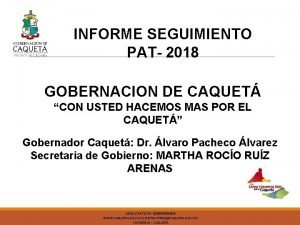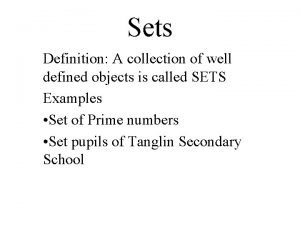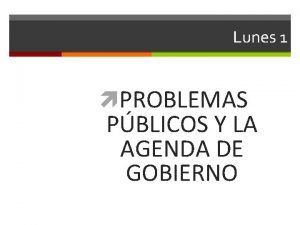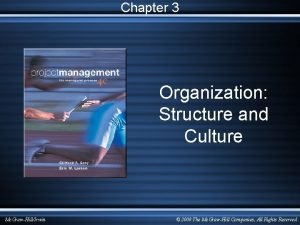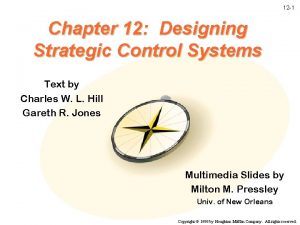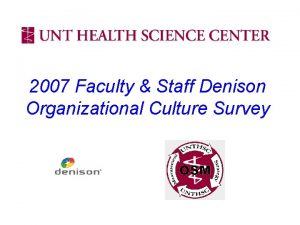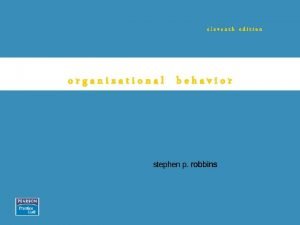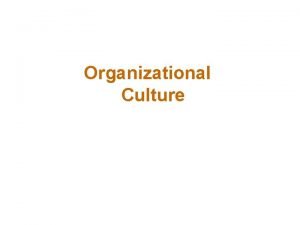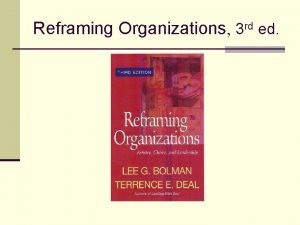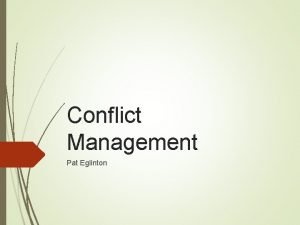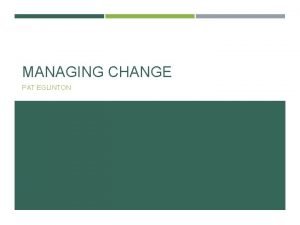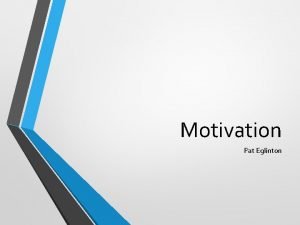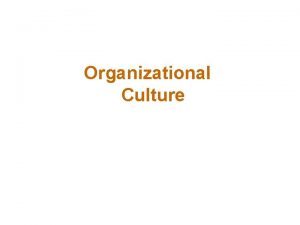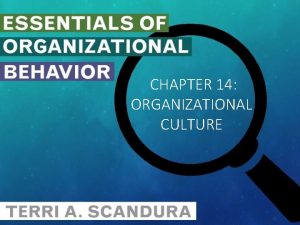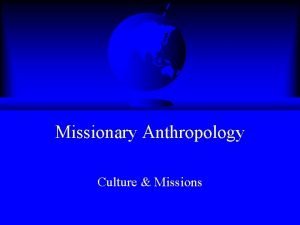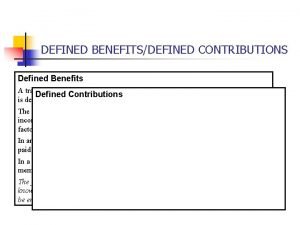Organizational Culture Pat Eglinton Agenda Organizational Culture defined










- Slides: 10

Organizational Culture Pat Eglinton

Agenda • Organizational Culture defined • Organizational Culture Articles • Organizational Culture in Bank Acquisitions and Mergers • Transformational Leadership and Organizational Culture • Exercises and Routines

Organizational Culture “A pattern of shared basic assumptions that a group has learned as it solved its problems of external adaptation and internal integration, that has worked well enough to be considered valid and therefore, to be taught to new members as the correct way to perceive, think, and feel in relation to those problems. ” - Edgar Schein on Organizational Culture • Necessary for successful leaders who must fully understand communicate the values and norms to associates across the organization

Organizational Culture Articles Organizational Culture in Bank Acquisitions and Mergers Transformational Leadership and Organizational Culture

Organizational Culture in Bank Acquisitions and Mergers • Culture: The sum total of ways of living built up by a group of human beings and transferred from one generation to another. • Organization Culture: the collective programming of the mind which distinguishes the members of one organization from another.

Organizational Culture in Bank Acquisitions and Mergers Cont’d • During a merger, employees (particularly from the acquired firm) are exposed to a different culture or way of doing things • Level of similarity between the organizations will dictate the degree of cultural conflict • A high level of cultural conflict may cause uncertainty and stress: lowered productivity, lowered morale and increased turnover • Case study for improvement: • Intermingle employees to encourage them to learn about each other’s culture • Organizational publication was created to facilitate communication of the importance of the new culture • One on one discussions and meetings with upper management

Transformational Leadership and Organizational Culture • There is constant interplay between culture and leadership • Transformational leader: idealized influence, inspirational motivation, intellectual stimulation, and individualized consideration • Exhibit a sense of vision and purpose: aligning others around the vision and empowering them to take responsibility for achieving it • Facilitate and teach followers to foster creative change • A transformational culture will intertwine a sense of purpose and feeling of family, resulting in work force that is more committed • There exists a rich set of norms that will readily adapt to forces of external pressure for change

Transformational Leadership and Organizational Culture Cont’d Six typologies of organizational culture: 1. Predominantly/Moderate Transformational Organization: very transformational. Individuals likely to be talking about purposes, vision, values, fulfillment. Deemphasize formal agreements/controls which can result in a lack of direction for employees. Structure will be loose, decentralized and flat. There is likely to be high expressiveness, creativity and flexibility. 2. High Contrast Organization: mixed transactional and transformational scores. Likely will produce more conflict between ways to achieve results but it will be constructive in nature. 3. Coasting Organizational Culture: Middle of the road: external controls balanced with self-control. The organization will coast by not maximizing its resources and opportunities. This will result in little change. 4. Predominately/Moderate Contractual Organizations: Highly transactional. Selfinterest of individuals is paramount with an emphasis on controls, directions and procedures. The structure will be highly centralized with a clear top-down chain of command. 5. Pedestrian Organization: Moderately transactional. Little is achieved outside of formal agreements and little to no change is exhibited within the organization. General sense of structure and procedure with routine work. 6. Garbage Can Organizational Culture: Lacking either transactional or transformational qualities. Lack of general consensus and the organization is a “garbage can of fruitless activities. ” It is lacking in purpose, vision, values as well as rules and regulations needed to control activities

Exercises and Practice Routines Exploring Organizational Culture

Exploring Organizational Culture • Objectives: • To explore the culture of your organization by describing your behaviors, values, and assumptions. • To reflect on which aspects of your culture are enabling or inhibiting your innovative projects. • Activity: • Split up into groups of 2 -3 people • Take 15 minutes to fill out the worksheet…
 Ken eglinton
Ken eglinton Pat pat seguimiento
Pat pat seguimiento Not well defined set examples
Not well defined set examples Agenda sistemica y agenda institucional
Agenda sistemica y agenda institucional Organizational culture diagnosis worksheet
Organizational culture diagnosis worksheet Inert organizational culture
Inert organizational culture Whats organizational culture
Whats organizational culture Denison organizational culture survey
Denison organizational culture survey Process of socialization
Process of socialization Institutionalization organizational culture
Institutionalization organizational culture Reframing organizational culture
Reframing organizational culture

